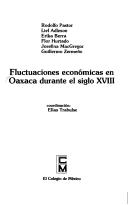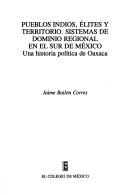| Listing 1 - 10 of 15 | << page >> |
Sort by
|
Book
ISBN: 1457193728 160732329X 9781607323297 9781607323280 1607323281 Year: 2015 Publisher: Boulder University Press of Colorado
Abstract | Keywords | Export | Availability | Bookmark
 Loading...
Loading...Choose an application
- Reference Manager
- EndNote
- RefWorks (Direct export to RefWorks)
Archaeology and history --- Byland, Bruce E., --- Oaxaca (Mexico : State) --- Antiquities.
Book
ISBN: 1283621282 9786613933737 0826351735 9780826351739 9781283621281 9780826351722 0826351727 Year: 2012 Publisher: Albuquerque University of New Mexico Press
Abstract | Keywords | Export | Availability | Bookmark
 Loading...
Loading...Choose an application
- Reference Manager
- EndNote
- RefWorks (Direct export to RefWorks)
The Roots of Conservatism is the first attempt to ask why over the past two centuries so many Mexican peasants have opted to ally with conservative groups rather than their radical counterparts.
Peasants --- Conservatism --- Religion and politics --- Political activity --- History. --- Religious life --- Catholic Church --- Oaxaca (Mexico : State) --- Politics and government.
Book
ISBN: 9781496208958 1496208951 9781496208972 1496208978 9781496203656 1496203658 9781496207821 1496207823 9781496208965 149620896X Year: 2018 Publisher: Lincoln
Abstract | Keywords | Export | Availability | Bookmark
 Loading...
Loading...Choose an application
- Reference Manager
- EndNote
- RefWorks (Direct export to RefWorks)
"A Revolution Unfinished examines the mobilization and subsequent repression of the Chegomista Rebellion of 1911"--
Oaxaca (Mexico : State) --- Mexico --- Juchitán de Zaragoza (Mexico) --- Juchitán (Mexico) --- Gobierno del Estado de Oaxaca (Mexico) --- Estado de Oaxaca (Mexico) --- Oaxaca (Mexico) --- Free and Sovereign State of Oaxaca (Mexico) --- Estado Libre y Soberano de Oaxaca (Mexico) --- History. --- History
Book
ISBN: 1477326065 Year: 2022 Publisher: Austin, TX : University of Texas Press,
Abstract | Keywords | Export | Availability | Bookmark
 Loading...
Loading...Choose an application
- Reference Manager
- EndNote
- RefWorks (Direct export to RefWorks)
Migration is typically seen as a transnational phenomenon, but it happens within borders, too. Oaxaca in Motion documents a revealing irony in the latter sort: internal migration often is global in character, motivated by foreign affairs and international economic integration, and it is no less transformative than its cross-border analogue. Iván Sandoval-Cervantes spent nearly two years observing and interviewing migrants from the rural Oaxacan town of Santa Ana Zegache. Many women from the area travel to Mexico City to work as domestics, and men are encouraged to join the Mexican military to fight the US-instigated “war on drugs” or else leave their fields to labor in industries serving global supply chains. Placing these moves in their historical and cultural context, Sandoval-Cervantes discovers that migrants’ experiences dramatically alter their conceptions of gender, upsetting their traditional notions of masculinity and femininity. And some migrants bring their revised views with them when they return home, influencing their families and community of origin. Comparing Oaxacans moving within Mexico to those living along the US West Coast, Sandoval-Cervantes clearly demonstrates the multiplicity of answers to the question, “Who is a migrant?”
Internal migrants --- Migration, Internal --- Return migration --- Sex role. --- Zapotec Indians --- Zapotec women --- Social life and customs. --- Social aspects --- Family relationships. --- Kinship. --- Oaxaca (Mexico : State) --- Emigration and immigration --- Social aspects.

ISBN: 9681200098 6076283114 Year: 1979 Publisher: México, D.F. Colegio de México
Abstract | Keywords | Export | Availability | Bookmark
 Loading...
Loading...Choose an application
- Reference Manager
- EndNote
- RefWorks (Direct export to RefWorks)
Un camino poco explorado en nuestro medio logra una mejor comprensión de una época de gran interés. A partir de los diezmos y de la contabilidad de las rentas eclesiásticas, los autores dan un panorama de la situación socioeconómica de Oaxaca en la centuria de las Luces (1700-1800).
History of Mexico --- anno 1700-1799 --- Oaxaca --- Titles --- History. --- Oaxaca (Mexico) --- Economic conditions. --- Land titles --- Oaxaca (Mexico : State) --- Land-warrants --- Titles, Land --- Land tenure --- Conveyancing --- Deeds --- Ejectment --- Prescription (Law) --- Vendors and purchasers --- Law and legislation --- Gobierno del Estado de Oaxaca (Mexico) --- Estado de Oaxaca (Mexico) --- Free and Sovereign State of Oaxaca (Mexico) --- Estado Libre y Soberano de Oaxaca (Mexico) --- Economics of specific sectors
Book
ISBN: 0870819909 9780870819902 9780870819292 0870819291 1607321033 9781607321033 Year: 2009 Publisher: Boulder, Colo. University Press of Colorado
Abstract | Keywords | Export | Availability | Bookmark
 Loading...
Loading...Choose an application
- Reference Manager
- EndNote
- RefWorks (Direct export to RefWorks)
Mixtec Indians --- Mixteca Indians --- Mixteco Indians --- Indians of Mexico --- Antiquities. --- History. --- Origin. --- Oaxaca (Mexico : State) --- Gobierno del Estado de Oaxaca (Mexico) --- Estado de Oaxaca (Mexico) --- Oaxaca (Mexico) --- Free and Sovereign State of Oaxaca (Mexico) --- Estado Libre y Soberano de Oaxaca (Mexico)
Book
ISBN: 0826360254 0826360246 Year: 2019 Publisher: Albuquerque : University of New Mexico Press,
Abstract | Keywords | Export | Availability | Bookmark
 Loading...
Loading...Choose an application
- Reference Manager
- EndNote
- RefWorks (Direct export to RefWorks)
"In this fascinating book Kathleen M. McIntyre traces intra-village conflicts stemming from Protestant conversion in southern Mexico and successfully demonstrates that both Protestants and Catholics deployed cultural identity as self-defense in clashes over local power and authority. McIntyre's study approaches religious competition through an examination of disputes over tequio (collective work projects) and cargo (civil-religious hierarchy) participation. By framing her study between the Mexican Revolution of 1910 and the Zapatista uprising of 1994, she demonstrates the ways Protestant conversion fueled regional and national discussions over the state's conceptualization of indigenous citizenship and the parameters of local autonomy. The book's timely scholarship is an important addition to the growing literature on transnational religious movements, gender, and indigenous identity in Latin America"--
Protestant churches --- Conversion --- Evangelicalism --- Missions --- History. --- Christianity --- Social aspects --- Political aspects --- Oaxaca (Mexico : State) --- History --- Evangelical religion --- Protestantism, Evangelical --- Evangelical Revival --- Fundamentalism --- Pietism --- Protestantism --- Religious conversion --- Psychology, Religious --- Proselytizing --- Protestant sects --- Christian sects --- Gobierno del Estado de Oaxaca (Mexico) --- Estado de Oaxaca (Mexico) --- Oaxaca (Mexico) --- Free and Sovereign State of Oaxaca (Mexico) --- Estado Libre y Soberano de Oaxaca (Mexico)
Book
ISBN: 9780822965749 0822965747 0822986671 9780822986676 Year: 2019 Publisher: Pittsburgh, Pa
Abstract | Keywords | Export | Availability | Bookmark
 Loading...
Loading...Choose an application
- Reference Manager
- EndNote
- RefWorks (Direct export to RefWorks)
"The Open Invitation explores the relationship between prefigurative politics and activist video. Schiwy analyzes activist videos from the 2006 uprising in Oaxaca, the Zapatista's Other Campaign, as well as collaborative and community video from the Yucatán. Schiwy argues that transnational activist videos and community videos in indigenous languages reveal collaborations and that their political impact cannot be grasped through the concept of the public sphere. Instead, she places these videos in dialogue with recent efforts to understand the political with communality, a mode of governance articulated in indigenous struggles for autonomy, and with cinematic politics of affect.--Provided by publisher.
Digital media --- Mass media and culture --- Mass media --- Political aspects --- History --- Oaxaca (Mexico : State) --- Politics and government --- Digital media - Political aspects - Mexico - Oaxaca (State) --- Mass media and culture - Mexico - History --- Mass media - Political aspects - Mexico - History --- Oaxaca (Mexico : State) - Politics and government - 20th century --- Culture and mass media --- Culture --- Electronic media --- New media (Digital media) --- Digital communications --- Online journalism --- History. --- 1900-1999 --- Mexico. --- Mexico --- Anáhuac --- Estados Unidos Mexicanos --- Maxico --- Méjico --- Mekishiko --- Meḳsiḳe --- Meksiko --- Meksyk --- Messico --- Mexique --- República Mexicana --- Stany Zjednoczone Meksyku --- United Mexican States --- United States of Mexico --- Gobierno del Estado de Oaxaca (Mexico) --- Estado de Oaxaca (Mexico) --- Oaxaca (Mexico) --- Free and Sovereign State of Oaxaca (Mexico) --- Estado Libre y Soberano de Oaxaca (Mexico)

ISBN: 9681209354 6075641432 Year: 1999 Publisher: México, D.F. Colegio de México
Abstract | Keywords | Export | Availability | Bookmark
 Loading...
Loading...Choose an application
- Reference Manager
- EndNote
- RefWorks (Direct export to RefWorks)
Este libro es un tejido de las redes económicas, políticas y sociales que hicieron posible al estado de Oaxaca. El autor hace un recorrido histórico y ameno, iniciado en la época colonial, caracterizado por una relación conflictiva y fundamental que explicará el devenir de esa región sureña: las de las élites que la encabezarán, las de los pueblos indios que sobrevivirán y se reproducirán a pesar de las hambrunas, las enfermedades y las políticas y leyes desamortizadoras y la de un territorio agreste, pero rico en varias de sus zonas, que será el punto de equilibrio para la relación de los dos actores anteriores.
History of Mexico --- Oaxaca --- Indians of Mexico --- Elite (Social sciences) --- History. --- Oaxaca (Mexico : State) --- Politics and government. --- Elites (Social sciences) --- Leadership --- Power (Social sciences) --- Social classes --- Social groups --- Gobierno del Estado de Oaxaca (Mexico) --- Estado de Oaxaca (Mexico) --- Oaxaca (Mexico) --- Free and Sovereign State of Oaxaca (Mexico) --- Estado Libre y Soberano de Oaxaca (Mexico) --- Indians of North America --- Indigenous peoples --- Meso-America --- Meso-American Indians --- Mesoamerica --- Mesoamerican Indians --- Pre-Columbian Indians --- Precolumbian Indians --- Ethnology --- History of the Americas
Book
ISBN: 0803284225 9780803284227 9780803269675 0803269676 9780803284197 0803284195 9780803284203 0803284209 9780803284210 0803284217 Year: 2015 Publisher: Lincoln
Abstract | Keywords | Export | Availability | Bookmark
 Loading...
Loading...Choose an application
- Reference Manager
- EndNote
- RefWorks (Direct export to RefWorks)
"An examination of the histories of Mexico and Oaxaca and the creation of the identity of the modern political state through the Banda de Música del Estado de Oaxaca (Music Band of the State of Oaxaca; BME)"
Music --- Art music --- Art music, Western --- Classical music --- Musical compositions --- Musical works --- Serious music --- Western art music --- Western music (Western countries) --- Political aspects --- History --- Banda del Estado de Oaxaca --- Banda de Música del Estado de Oaxaca --- Music Band of the State of Oaxaca --- State Band of Oaxaca --- BME --- History. --- Oaxaca (Mexico : State) --- Gobierno del Estado de Oaxaca (Mexico) --- Estado de Oaxaca (Mexico) --- Oaxaca (Mexico) --- Free and Sovereign State of Oaxaca (Mexico) --- Estado Libre y Soberano de Oaxaca (Mexico)
| Listing 1 - 10 of 15 | << page >> |
Sort by
|

 Search
Search Feedback
Feedback About UniCat
About UniCat  Help
Help News
News